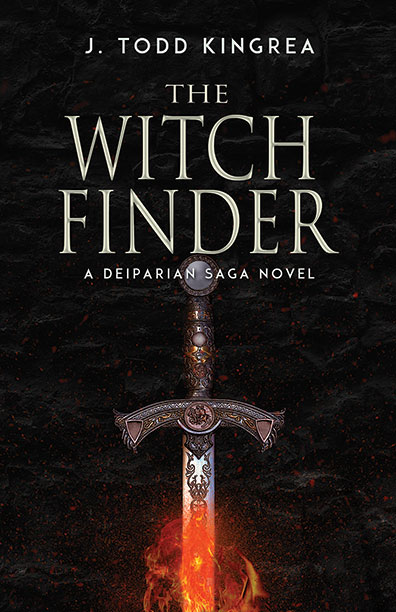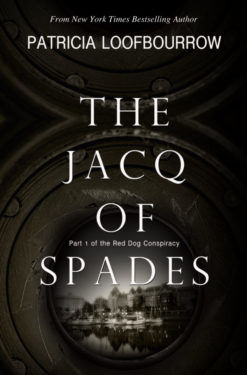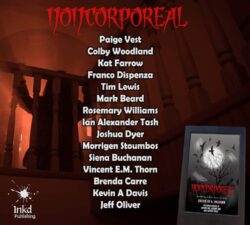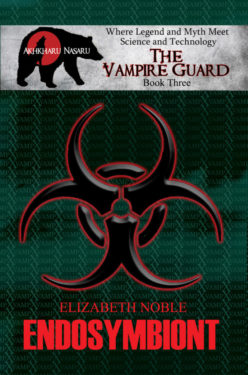The Deiparian Saga
by

In a post-apocalyptic world where tyranny and medieval torture reign supreme and witch burnings are an everyday occurrence, a top Witchfinder must confront the very Church he serves when he learns of its dark past and twisted plans for the future.
The Church of the Deiparous rules with an iron fist and its rising star, Witchfinder Imperator Malachi Thorne, is committed to leading its cause. Thorne is a man on the fast track to greater things so when a convicted traitor and heretic escapes his grip, he won’t tolerate it marring his perfect record. As he pursues his quarry, he must confront demons, sorcery, and a cult of witches out for his blood. But when Thorne comes face to face with the Church’s dark past and its twisted present, his faith is tested to its limits. Now Thorne must decide who and what he believes in—and what he will do about it.
Editors:
Genres:
Tropes: Dystopian Governments, Enemy to Ally, Post-Apocalyptic, Reluctant Hero, Secret Society
Word Count: 115,756
Languages Available: English
Tropes: Dystopian Governments, Enemy to Ally, Post-Apocalyptic, Reluctant Hero, Secret Society
Word Count: 115,756
Languages Available: English
CHAPTER 1
TEKOYA
Friday, May 22nd, 999 A.E.
A beautiful day for the salvation of souls dawned. The sun blazed bright but not unduly hot, unusual for this time of year, and a soft breeze whispered like a new mother’s prayer. The miserable summer winds would soon arrive, humid and prickly. But today’s promised comfort, a welcome change from winter’s frigid gusts. The birds took advantage of it, wheeling and gliding across a sky that would soon be blackened with the smoke of burning bodies.
READ MOREWitchfinder Imperator Malachi Thorne sat beneath the awning of the grandstand and looked out over the crowd in Talnat’s main square. Congregants jostled one another for better views, some with small children perched on their shoulders. Others gossiped, shared bawdy jokes or purchased gingerbread and custard cups from the vendors around the square. An acrobat on stilts entertained giggling children. Clots of men hooted and jeered at the prisoners lined up before the grandstand, commonly known as the Judgment Seat, on the northern end of the square.
The wealthy filled the balconies that jutted from buildings like crooked teeth, where they enjoyed tekoyas without having to mix with the sweaty crowds below. Handsome sums exchanged hands in order to be waited on by servants, and to savor the spectacle from the luxury of padded couches and leather chairs. They placed bets on how long it would take a heretic to scream once the fire took hold, or before a hanged man stopped jerking.
Thorne smiled as he absorbed the perfect day, his favorite day: the viridian-streaked sky, the succulent aroma of kebobs over coals, the colorful banners of the Four Orders undulating in the breeze, the infectious tune of a minstrel band.
And four souls that would find eternal release from the corruption that had lured them from the Church’s embrace. Four crimson stakes, like the bloodied talons of a demon from the Twelve Planes, stood in a diamond pattern in the center of the square. Men piled wood and straw around each one.
Behind him Talnat city officials talked softly about the tekoya, the epitome of the Church’s order and law. It’s formality was reassuring, the purpose unquestionable.
“Heh, good morning, Malachi,” Constable Thurl Cabbott said as he approached the cathedra. He wore wine-colored leather armor and a matching cape, held in place by the diamond-shaped pin worn by all ranking Church servants. His black breeches fit snugly into worn black boots. Sharp blue eyes lined with wrinkles looked up at Thorne. “So how many does this make for you?” He gestured toward the prisoners.
“Dario tells me two hundred.”
Cabbott whistled. “That’s a lot of heretics in only three years’ time.”
Thorne traced his raven-black mustache and goatee with thumb and forefinger. “Souls, Thurl,” he corrected. “Their words and deeds may’ve turned them into heretics, but the Church released them from that. Their souls have been purified.”
“How many of those were involved in The Communion?”
He shook his head, ponytail swaying. “That I don’t know. You’d have to ask Dario.”
“You should be proud, Malachi. That’s quite a feat even for the youngest Imperator in history.” Cabbott scratched at his gray-streaked beard as he paused. “Merrick would’ve been proud of you.”
The familiar pang of guilt and grief pricked Thorne’s chest at the mention of his mentor’s name. He tried to keep it from showing on his face.
The two men watched the square in silence for a moment. Acrobats and jesters cavorted to the applause of children. Behind the grandstand a dog barked.
“Beautiful day,” Thorne said, awkwardly changing the subject.
“That it is. Wish I’d had one like this on my last day off.”
“Am I still giving you days off?” he asked, glancing at the constable with a lighthearted gleam in his green eyes.
“Not enough. I’m getting to be an old man. I should have more free time.”
“You’re not getting old.“ Cabbott’s widening circle of visible scalp begged to differ.
“Heh, I’m nearly a quarter century older than you.”
Thorne smiled. “And still able to run circles around your two deputies.”
“Yeah, but all that running makes me tired. I should have more free time—you know, to rest.”
In the square the preparations were complete. Deputies maintained a clean perimeter around the edge of the crowd. As the sun climbed higher, it glinted off the twisted steel towers of Old Talnat. Gaping holes revealed rows of vacant floors and debris. Structural beams poked out like the broken ribs of an animal carcass.
Talnat—or Atlanta as some claimed it was once named—like most major towns, still possessed these crumbling relics of its former life. Before the Great Cataclysm they had been called ‘skyscrapers.’ To Thorne they represented tombstones more than towers, symbols of humanity’s frailty and hubris. Extremely unsafe and suffused with a nagging sense of dread, few birds nested among the ruins. Even wild dogs shunned them. They testified to a lost and dead world where the Church said too much personal choice had led to destruction.
“We’re ready to begin, Your Grace,” the Bishop of Talnat said as he stepped into Thorne’s line of sight. He wore the traditional blue cassock and white cope of the Kyrian Order. His face seemed too small beneath the upturned brim of his domed hat.
Thorne nodded and sat up straighter on the worn cushion. The unforgiving wood pressed against his back like half of an iron maiden.
A sleepy-looking clerk with spidery fingers, dressed in the white and gold robes of the Cartulian Order, sat to Thorne’s left. He laid out several quills and a stack of parchment, uncorked a bottle of ink, and nodded at the Imperator. Thorne gestured for the bishop to proceed.
In front of the grandstand two trumpeters played a fanfare that echoed off the surrounding buildings. Laughter and conversation stopped. Vendors finalized their sales. The band put down their instruments. Only the tattle of birds along the rooftops defied the silence.
“By the will of Heiromonarch Dobrin Kristur,” the bishop said in a strong, mellifluous voice, “according to the laws by which we live, and in the name of the Divine Church in whom we have our being, let it be recorded that the Talnat tekoya of May 22nd, 999 A.E. hereby begins.”
The trumpeters replayed the fanfare. Whooping and hollering, and a smattering of applause, rippled through the crowd.
Tang Tien Qui, the short and officious Witchfinder of Talnat, tugged at his scarlet surcoat as he stepped to the front. His cape, capotain hat, tunic and breeches—all black—were identical to Thorne’s. He made a show of adjusting his rank pin and Thorne rolled his eyes.
“Congregants of Talnat,” Qui announced, his voice higher than the bishop’s but bearing the same authority and ceremony. “We are gathered here today because the laws of the Divine Church—as defined by the sacred Testament—have been broken. The offenders must be punished, or else chaos and darkness will swallow us as it did our forebears over a thousand years ago, when the moon fell to earth and the land turned against us.
“Out of that time of lawlessness and barbarism, our ancestors forged the order and society we enjoy today. They established and maintained the foundation of law. We must likewise maintain that which has been entrusted to us, for the sake of future generations who will love and serve the Church.”
He paused before proclaiming, “The Church is generous.”
The crowd responded, “The Church is generous.”
“The Church is compassionate.”
A single voice of unified hundreds repeated the phrase.
“The Church is God.”
Again the repetition.
“Let us now declare the Four Tenants of the Church,” Qui said, gesturing toward the banners of each Order. The single word embroidered in bold letters on each was stated in unison: “Faith. Wisdom. Obedience. Loyalty.”
“This tekoya is carried out by the authority of the Church through its official representative—His Grace, Master Malachi Thorne, Witchfinder Imperator of the Paracletian Order. Let all that transpires here today be recorded for the salvation of our souls, according to the grace of the Church. Amen.”
“Amen,” the crowd repeated. They signed themselves with the symbol of the Church: the fingertips of one hand on the forehead, down to the left shoulder, to the middle of the chest, and up to the right shoulder, in one smooth motion. Some jokingly referred to it as “quartering” oneself. But only when no Churchmen were within earshot.
Qui and the bishop sat down behind the cathedra.
Thorne walked to the edge of the grandstand. The square smelled of freshly cut wood, warm bread and unwashed bodies. Somewhere among the crowd a dog barked twice. Placing his hands on the railing, he looked into the variegated cyan sky. His gaze lowered to take in the brooding stone buildings, silent sentinels of untold tekoyas. Finally, he scanned the sea of faces. I wonder if these prisoners realize what a blessing it is for their souls to be saved on such a beautiful day as this?
“Before us today,” Thorne said, his sonorous voice in sharp contrast to that of Qui and the bishop, “stand four who have been found guilty of crimes against the community and our God, the Divine Church. Because they have committed the capital offenses of witchcraft and heresy, four bentanni will be hung in the Talnat cathedral as a reminder of their shame and guilt. These bentanni will remain on display until the family of each prisoner has passed the fourth generation, beginning today.”
He fixed his gaze on the four prisoners lined up before the Judgment Seat. “May the Church have mercy on your souls. Bring forth the heretic Barnabas Kordell.”
Two deputies ushered a stout black man toward the dock that hunkered before the grandstand. He limped badly and his shaved head gleamed in the sunlight as he climbed the four narrow stairs to the platform.
Like all heretics he wore the bentanni, a yellow shift with red and orange cloth flames sewn around the hem. The flames rose to the waistline and above them, encircling the torso, gruesomely painted demons and devils cavorted. Unlike most heretics, however, who by this point were reduced to fits of wailing or traumatized pleading, Kordell stood tall in the dock. He rested his manacled hands on the railing that encompassed three sides of the platform.
“Barnabas Kordell, the courts of the Paracletian Order have found you guilty of heresy. Evidence has been brought against you and verified. You have confessed to this crime while in the presence of a cleric and a lawyer. Do you have anything to say before sentence is carried out?”
Kordell stared coldly up at him with his remaining eye and squared his shoulders. He’d displayed a profound tolerance for pain and had endured much at the hands of the torturer, but refused to recant his treasonous teachings or divulge his associates. It was surprising Kordell could stand at all, much less walk. Harsh imprisonment and torture made him look nearly twice his forty-four years, yet he displayed no contrition or meekness.
“You wish me to admit that I’ve undermined the authority of the Church with unorthodox teaching. You want me to grovel and say there’s no path other than that offered by the Church. You want a faithful penitent—cowed by threats and fear, broken by your system—“
“That’s enough.” Thorne didn’t raise his voice but it boomed across the square.
“—convinced there is no freedom outside the Church.” Kordell’s voice grew louder. “But I will not!”
“Silence!” Thorne slammed his hands on the railing and leaned forward. “Deputies!”
Kordell pivoted so he faced the crowded square. “Friends! There is a better way! And Traugott knows. He speaks of it—and many are listening!”
Two deputies neared the dock.
“Listen to Traugott!” he bellowed. “It’s not heresy he speaks, but freedom and choice!”
Somewhere in the crowd a dog barked three times.
Kordell collapsed as if he were a child’s marionette whose strings had been cut.
The deputies paused as they reached the steps, eyes widening, confusion etched across their faces. They looked down. An arrow shaft protruded from each of their chests. Blood seeped onto their wine-colored leather armor. Realization dawned and they lurched against each other before toppling to the ground where they lay unmoving.
From somewhere in the crowd a flaming torch arced through the air. Several others followed from different locations.
Thorne gripped the railing. “What in the Twelve Planes—”
The torches plummeted into the crowd. People screamed and shoved as bits of clothing caught fire. A few tried to extinguish the flames but the majority scattered in a maelstrom of colliding bodies and flailing limbs. The performer on stilts collapsed into a cart of jellied candies. Children snatched and grabbed as parents yanked them to safety.
Deputies tried to maintain order but were too few in number. They bobbed among the people like corks in boiling water.
The pounding of horse’s hooves sounded above the din.
“Constables, secure this crowd!” Thorne roared. The thought that they probably didn’t hear him—couldn’t hear him through the chaos—only enraged him further.
In the dock, Kordell leapt to his feet and descended the stairs as quickly as his manacled ankles allowed.
A vendor’s stand erupted in flame, scattering those nearby in all directions.
“Damn it, he’s getting away!” Thorne said through clenched teeth. He saw Qui and Cabbott sprinting toward the dock.
Three horses burst through the crowd on the eastern side of the square. They appeared to be panicked by the noise and confusion.
The overtaxed deputies attempted to restore order but didn’t know whether to put out the fires or keep people from trampling each other. Looters scampered away with their hands full.
Two of the horses raced into the center of the square. The third veered toward a wagon loaded with wood and straw parked just south of the stakes. Smoke plumed from several locations.
Kordell stumbled as his feet hit the ground but maintained his balance. The two horses bore down on him.
Qui closed in on the prisoner but collided with a pair of looters. All three crashed to the ground as pies and sausages flew into the air.
The bishop leaned over the grandstand railing, taking in the pandemonium with bulging eyes. “Horses don’t run towardfire…” he said, mostly to himself.
“What?” Thorne yelled, shooting the man a sideways glance.
“Those horses,” the older man pointed. “There’s something not right—“
Both horses slowed as they reached the dock.
The truth hit Thorne like a punch.
Each horse carried a bareback rider hanging low and snug to the horse’s far side. A black roan halted in front of the dock; a brown one behind it. Both riders wore garments that matched their mount’s coloring. The brown’s rider hauled himself upright by the mane with his left hand. With his right he hoisted Kordell up behind him. The prisoner flopped on his stomach, feet kicking the air like a beached fish.
Simultaneously, the horseman in front of the dock righted himself and leveled a crossbow at the grandstand.
Qui was on his feet again. More deputies converged on the square, halberds and sabers clattering.
The black’s rider fired the crossbow toward Thorne.
“Bolt!” he yelled as he yanked the bishop down with him. The projectile zipped over their heads and gashed a hole through the canvas behind them.
Both horses galloped toward the southern end of the square, townspeople scampering out of the way. Thorne peered over the railing, then leapt to his feet. He grabbed a crossbow from the corner of the grandstand. “Damn damn damn—“
Kordell bounced like a sack of wheat as the horses raced past the fuel wagon. The third rider threw a torch into the wagon. Flames caught the wood and straw, spreading rapidly. Smoke blanketed the square with a grimy haze. Deputies chased on foot while others grabbed horses of their own.
“Son of a—“ Thorne cursed under his breath as he sighted down the length of the crossbow. He exhaled, squeezed the trigger, felt the crossbow kick. The bolt sailed into the smoke and flames. He watched through the shimmering heat as the escapees disappeared down a side street. He ground his teeth together and flung the crossbow into the square.
“Damn it!” he bellowed. He twisted around and shoved the cathedra aside. The clerk, now fully awake, recoiled. The city officials cowered. He bared his teeth and glared at the bishop who was picking himself off the floor. “Find me the Chief Constable—now!” he snarled, stomping through the grandstand. “And have that runt, Qui, up here by the time I get back.” He took the stairs two at a time.
A few congregants lingered, waiting for what might happen next. For a moment Thorne thought he heard laughter and cheering from somewhere. The sound turned his stomach.
He’d heard of dissention in other places. Reports came to the Church with troublesome and increased frequency, telling of congregants who spouted dangerous ideas and created disturbances. But Thorne hadn’t heard of any that were so brazen as to attack a tekoya. Until now. He snarled—face flushed, fists clenched—as he stormed into the square, shouting instructions to the deputies. People slowly drifted back to the perimeter of the square. All of the fires were extinguished except for the fuel wagon which was now a bonfire on wheels.
“Find those archers!” Thorne demanded, pointing at the two corpses lying by the dock. “Arrest whoever threw those torches! And secure this area immediately!”
The deputies scattered, eager to get away from the Witchfinder’s intimidating six-and-a-half foot presence. He put his hands on his hips and glared around at the results of the bedlam.
A deputy hauled the remaining prisoners off the ground. They had attempted to flee but forgot they were manacled together. None of them could hide their pleasure as the guard led them away.
Cabbott approached, breathing hard, his face streaked with soot and perspiration.
“Well?” Thorne snapped.
The constable shook his head. “Qui’s got men…after them,” he puffed.
“I want to know who shot those deputies.”
“I’ll pull a team together. We’ll go through…every building where they could’ve been. We’ll also check witnesses. Maybe somebody saw someone with a bow.”
“I want statements from every person on those balconies, “Thorne said, gesturing around the square. “Get these buildings closed down. Search every room and roof overlooking this square—“
“Heh, like a whore checking for disease. I get it.”
Two mounted deputies barreled up and reined to a halt before Thorne and Cabbott, adding more dust to the cloudy air. Both looked as if they would rather be doing most anything else.
“No luck, m’Lord,” one said. “Those streets are a maze—”
“But we still got men looking for’em,” the other added quickly upon seeing Thorne’s eyes narrow into slits of emerald fire.
“It might be a maze,” he growled, “but those riders obviously know the way through it. Otherwise they would not have used it. And you work here, do you not? You know these streets.”
“Aye, we do,” the first one replied. He pointed behind him. “In that part of town the streets turn all over the place and they got dead ends aplenty.”
“That’s what we’re trying to tell you, my Lord,” the second added. “It’s such a warren of alleys an’ dead ends, only someone familiar with’em—“
“Local help,” Cabbott spat.
“Yes sir,” the deputy replied. “At least one of them riders—maybe all of’em—must be from Talnat.”
Thorne nodded. At least it was a start. “How many roads lead out of there?”
The deputies glanced at each other to see who would answer, or who had the most accurate answer. “Probably fifteen or twenty, at least,” the second offered.
Thorne nodded again and folded his arms. “Get back to your search. Cover as many exits as you can. Report to me directly when you have something.”
Both turned and galloped away.
Cabbott studied the buildings. Thorne knew the constable’s mind was working feverishly, estimating an arrow’s flight distance, trajectories and where potential clues or evidence might be found.
“Have someone remove the bodies,” Thorne said, running his hand over his hair. It was warm, verging on hot, from the bright sun.
Cabbott motioned several men to join him, but turned briefly to acknowledge Thorne’s command.
Thorne looked around as he redid his ponytail. Order slowly returned to the square. “I’m going back to wait for Qui and Constable Kefflen,” he said. “See that some of the other constables gets this whole area cordoned off. It’s a crime scene and it’s already been ruined. We’ll probably come across a purple bull with wings in this mess quicker than we’ll find a decent clue.”
Cabbott nodded and went back to giving orders.
COLLAPSELia K. on NetGalley wrote:A thousand years ago the earth was nearly destroyed after a cataclysmic lunar event. Human civilization has slowly recovered, and has reached a level comparable to the Middle Ages.
The Witchfinder starts off with a bang as Barnabas Kordell, sentenced to death for heresy, escapes execution at the hands of Malachai Thorne, Witchfinder Imperator of the Church of the Deiparous. An outraged Thorne is determined to bring Kordell and a mysterious person called Traugott to justice. As a result of this dangerous and violent journey all of the beliefs Thorne holds dear are challenged, and dark secrets about the Church he has faithfully served are revealed, turning his life upside down.
This is an outstanding debut novel. Kingrea does an excellent job building both the world of Deiparia and the characters who inhabit it. He does a great job of describing Thorne’s inner conflict and his change from a man confident that he has all the answers to one who realizes he has much to learn. Teska, who will probably be Thorne’s love interest, goes through similar changes, from someone bent on revenge to someone who is willing to work with those she once perceived as enemies. Other secondary characters are also well-drawn.
Along with heretics the Church hunts down and destroys witches. I really enjoyed the scenes featuring the witches, and Kingrea’s interpretation of them and their craft is different from other novels I’ve read. Very well done!
The last part of the last chapter has a different setting and different characters, but ties back to the rest of the book. It has left me eager to read the next book in the trilogy, The Crimson Fathers, scheduled for release in Fall 2022.
The only thing I wish the book had is a map of Deiparia. Some places are identified (Talnat is Atlanta, Attagon is Chattanooga), but I’d like to see how the coastline of the southeastern US changed in this world and more details on the exact location of other towns and villages.
Christopher Levon on Barnes & Noble wrote:Thanks, Netgalley and Publisher for letting me read! The action and the epicness in this one are on a really high level. I also think the world-building, the progress of the plot, and the character development progressed simultaneously. All characters introduced serve a purpose and the story moves forward pretty fast. Basically, you can't put the book down, because it's always getting to an interesting part. A lot of interesting themes and tropes are combined - the true meaning of justice, how following blind believes actually leads to suffering and disaster, that enemies-to-lovers that is just classic, the path each of us needs to take in order to find what they truly believe in and fight for.. We have also that lovely fantasy mix of magic, demons, witches, sorcerers, dark secrets being revealed. And the ending is also something else entirely! Definitely a must-read!
J.Todd Kingrea has really made an impressive debut for a novelist. The creation of a whole new world, his creation is easily comparable to Tolkien or George R.R. Martin. And he has the intense page turning abilities of Stephen King.
That being said, Kingrea has created a post apocalyptic world where the church rules with an iron fist and brutal consequences a'la' Salem, Massachusetts, 1692 - sometimes much worse.
Malachi Thorne, who carries a passion for his work of exposing and capturing witches, faces numerous occupational struggles in his line of work, needless to say, but as his story continues, he begins to doubt himself and worse yet, the very church he works with in his quest to rid the world of evil.
Kingrea's quasi medieval world is a dark place full of horrors, torture and oppression. This is a fast paced novel that will keep you up well past your bedtime and leave you begging for more once your finished. It's a true relief that there is more to come, because like Lay's Potato Chips, you can't devour just one!







